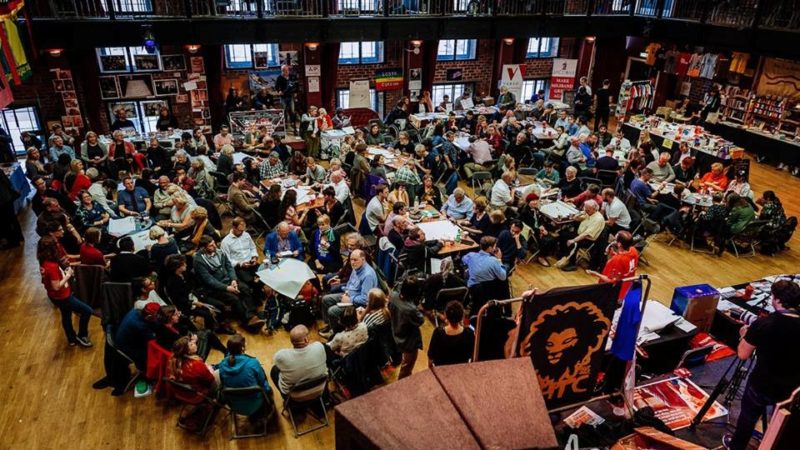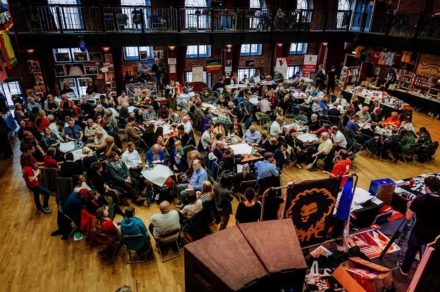

Last week Luke Akehurst, secretary of Labour First, went on Twitter to denounce a Bristol constituency Labour party (CLP), where Momentum is active, for sending for delegates to annual conference this year.
Luke’s analysis is marred by his inability to look past his own interests. Rather than seeing the renewed enthusiasm for the party conference as a much needed re-invigoration of internal democracy, Luke instead chose to cast doubt over the motives of delegates who don’t fit inside his vision of the “broad church”. He misses the point entirely.
Greater participation in our party’s annual conference isn’t something to be sneered at, it is something we ought to embrace.
In September party activists from across the UK will be gathering in Brighton for the party’s main policy-making and networking event of the year, the annual conference. Up and down the country, CLPs are preparing for it – debating rule changes; suggesting contemporary motions; agreeing on nominations to the party’s national bodies and selecting the delegates who will represent them.
This year has seen a huge upsurge in the numbers of people who want to be involved, this was only to be expected given the massive expansion in party membership in recent years. Surely, as democrats, we can only argue for greater participation for our expanded membership? Here I outline the main reasons why.
Sadly, the Labour Party conference is still not representative of the wider Labour movement. It is a space dominated by older men. The party rulebook recognises this and therefore makes space for CLPs to send an additional women’s and youth delegate to counteract this tendency. It is unforgivable that our conference continues to be so unrepresentative. It is incumbent on us to seek a better balance at conference by electing women and young people both as our main delegates and also by sending additional youth and women delegates.
Party conference is the sovereign decision-making space of the party. It is the main opportunity for members to come together to decide on our common direction. We should be encouraging more people to be involved in this process because the more delegates who attend, the broader our decision-making base is.
Involving more members in conference is also crucial to deepening their involvement in the party. New members should especially be encouraged to stand as conference delegates to learn about how our party works and to deepen their involvement in and responsibility for it. It is only by getting this buy-in that we will develop the dedicated team of party activists that we need to build the campaigning force that will return Labour to government.
The effects of shutting members out of the decision-making process has been demonstrated in Scotland. Some Scottish CLPs have not sent a delegate to conference in over 20 years. This means these party members have not had any say in developing policy. Given that comrades in Scotland have no voice in the party, is it any surprise that activists feel increasingly alienated.
Some have claimed that allowing more people to attend conference is too costly. Following the general election, Labour’s finances were in a very sorry state. The party was in huge amounts of debt and was at times flirting with bankruptcy. In May 2016, however, party treasurer Diana Holland told the national executive committee that, following the surge in membership before the previous year’s leadership election, the party had wiped out its significant debts as well as having amassed a war chest for the May elections.
In the summer of the 2016, the party experienced another huge boost to the coffers as a result of the second leadership elections both in terms of an increased membership and the £25 levy on registered supporters.
The party’s financial revival is a direct result of the explosion in membership. Now our financial future is more secure, we cannot use cost as an excuse to pull up the drawbridge to participation. Where there are financial barriers the party must find the means to overcome them, be that through local fundraising or by dipping into coffers. Within the party of equality and social justice, we must never allow the inability to pay to be a barrier to participation in democracy.
The Labour Party faces big challenges, but our mass membership is one of our biggest assets. If we are to drag ourselves out of the electoral malaise and to form a government that will work in the interests of the majority, then it is our membership we will rely on to deliver leaflets, to knock on doors, to promote Labour’s message in their workplaces, social spaces and communities.
If we expect this kind of commitment from our members, we must be ready to show an equal commitment to them. A good first step would be to celebrate our conference as an exercise in democratic participation and encourage participation from the widest possible section of our membership.
James Goodman is a Labour and Momentum activist based in South London.
Want to support LabourList’s dedicated coverage of the party? Click here.




More from LabourList
‘It’s one year since I became Britain’s youngest MP. Here’s what I’ve achieved so far’
Tribute: ‘David Lipsey’s joie de vivre is missing in Labour politics today’
Ellie Reeves: ‘One year in, the next phase begins – focused on living standards’